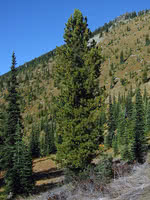Mon-Fri 9am - 5pm Mountain time
Whitebark Pine vs Frank Hazelnut
Pinus albicaulis
Corylus avellana Frank
NOT AVAILABLE THIS SEASON - MIGHT RETURN
Endangered
Whitebark Pine is a beautiful coniferous tree that produces tasty, edible nuts. You'll love this trees' rustic and natural appeal, making it an excellent specimen tree.
It is an endangered species from the Rocky Mountains, this slow grower seldom produces cones until it is 50 years old but regularly survives to be 500 or more years of age. Our staff think it is among the most attractive pines we have grown.
Whitebark Pine is well-known for maintaining snow drifts, providing food and shelter to many species of wildlife, and bringing stability to steep slopes. This high elevation and adaptable tree is deer resistant and can withstand a variety of soils and moisture levels.
The Frank Hazelnut produces nuts that are medium size and ripen mid August. This is one of the best eating hazelnuts for cold climates. It is a medium size deciduous tree from Saskatchewan, Canada. It is a productive tree that has been tested as both a pollinizer and a main crop cultivar for colder climates. The Frank Hazelnut is one of the cold hardiest hazelnut trees on the market and known to be resistant to eastern filbert blight.
Not all hazelnuts pollinate with each other so it is important to pick the correct pollination pairs. Two compatible varieties of hazelnut are required to produce nuts. Nuts will only be produced once maturity is reached, around 2-3 years.

